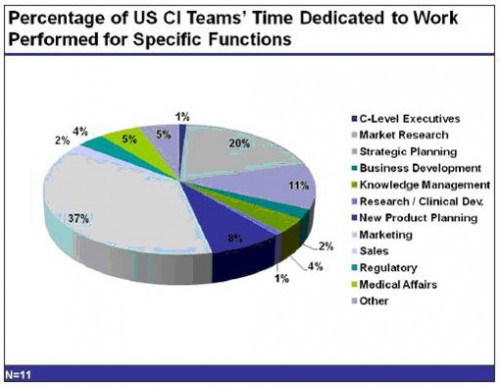Strategic Pharmaceutical Competitive Intelligence: Trends and Implications for the Future
22 Nov 2010 • by Natalie Aster

London – Pharmaceutical competitive intelligence teams face unique challenges in today’s market. Given the economy’s turbulence since 2008, many companies have cut their CI teams entirely. But the study shows that organizations that retained their competitive intelligence groups through the tough times are gradually increasing resources for CI. Furthermore, they’re elevating these teams’ strategic positioning to deliver maximum impact.
The report “Strategic Pharmaceutical Competitive Intelligence: Trends and Implications for the Future ” by Cutting Edge Information includes benchmarks that detail competitive intelligence teams’ structure, reporting lines, budgets and staffing metrics. Other metrics explore team responsibilities, additional support from other functions and performance measurement methodologies.
Report Details:
Strategic Pharmaceutical Competitive Intelligence: Trends and Implications for the Future
Published: November 2010
Pages: 148
Price: USD 7,695
Report Sample Abstract:
Create a Dedicated Competitive Intelligence Team that Communicates with Strategic Decision Makers
The executive leadership team’s needs may be few and far between compared to those of the individual brands or business units. So it is important to develop a competitive intelligence team that can support product managers and directors, but also the C-level executives who generate corporate strategy. Cutting Edge Information ’s survey found that, on average, only 1% of responding companies’ competitive intelligence time is spent serving C-level executives. 37% of the time, competitive intelligence teams serve the marketing function. The next-highest percentage of time spent is 20% for market research.
Providing Intelligence on Managed Care
Virtually every interviewed and surveyed competitive intelligence team is starting to — or is at least considering — monitoring competitor activities within the managed care arena. For most companies surveyed, CI coverage of managed care teams is either limited at best or non-existent.
Teams trying to enter this space will face uncertainty about ethical and legal approaches to gathering intelligence. While admitting it is difficult to gather information on specific competitor contracts, one executive affirmed that “We’d love to know what our competitors are doing on that front.” “It is such an important area to know about,” the executive added. “The world is moving to a much more payer-centric space where the contracts you sign with payers are crucial. But we would need to figure out how to even ask those questions ethically or legally.”
More information can be found in the report “Strategic Pharmaceutical Competitive Intelligence: Trends and Implications for the Future ” by Cutting Edge Information .
Analytics & News

